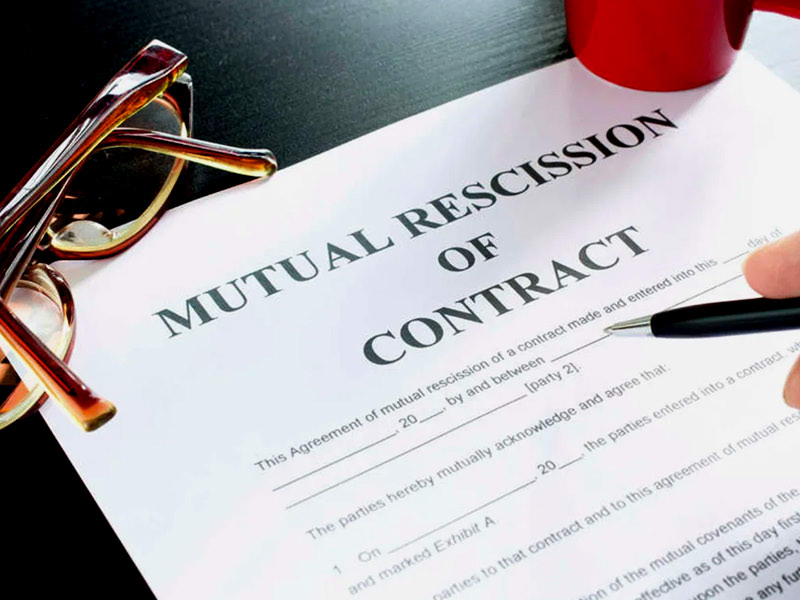As long as all goes well with your sales and purchase transaction, you probably won’t have to be concerned about your seller or buyer rescinding the contract.
However, if you are a seller who receives a legally unacceptable notice of rescission, or if you’re a buyer and want to rescind a contract you’ve signed, you are well advised to obtain legal guidance quickly.

What does rescind a contract mean?
Rescission is a provision of state contract law that protects the parties to contracts with the legal right to withdraw from a contract within an allowed timeframe. That means that when a contract is rescinded, the signed contract is effectively voided.
The difference between termination and rescission of a contract is that a terminated contract becomes unenforceable starting on the date of the termination, whereas a rescinded contract is treated as if there had never been a contract at all.
If a contract is terminated, both parties remain obligated under the terms of the contract. That means that, even after the termination of the contract, one or both parties, depending on circumstances, can sue each other for failing to honor the legal agreement. But, if the contract is rescinded, all the contractual obligations disappear. Further, in many cases, all parties to the contract mutually agree to the rescission.

What Happens After a Contract is Rescinded?
To legally rescind a contract requires that the parties to the dissolved contract must be returned to their conditions prior to signing. Any real or other property exchanged must be returned to the respective parties and any money must be promptly repaid.
Under rescind contract law, there can be no legal rescission without such restoration of all the parties to their pre-contract condition. Therefore, rescission is only achievable as a practical outcome in the earliest days after the contract is executed.
What Should You Do if You Receive a Rescission Notice?
The buyer must give the seller a notice in writing by the specified date and time marking the end of the period of the right to rescind. Normally, the notification may be delivered by email, fax, or in person.

What Kinds of Contracts Can Be Rescinded?
If the parties mutually agree, virtually any type of contract can be legally rescinded. Contracts for real estate sales, business sales, car sales, service sales, loan repayments, membership sales, and various others typically include a stipulation of the right to rescind within a specified timeframe.
Can You Rescind After the Cancellation Period Has Elapsed?
Normally, a contract cannot be rescinded after the rescind period, also known as the remorse period or cooling-off period, has elapsed. After the permitted timeframe for rescission of contract has ended, the contract can be terminated only in case of failure to meet the terms or conditions of the written agreement.

Who Can Rescind a Contract?
A buyer may opt to rescind a voidable contract within the legal timeframe for cancellation. Or, the seller may simply agree to cancel the contract. Before you take action to rescind a contract you have entered, protect your rights by having your attorney take a look at the language of the contract and advise you on how to proceed. Your conveyancer can review the contract and confirm that there are grounds for it to be rescinded.
Your legal representative can write a proper notification for you and have it delivered to the seller for you. Verbal rescission notifications are not legally binding and may not be accepted by the court.
Examples of Real Estate Cancelation Cases
Canceling real estate deals is not uncommon and is especially costly to the parties involved in terms of time and opportunities forfeited.

Can conveyancing solicitors help with a rescission or termination of a contract?
If you found this article because you have any issues with your contract, you can call us 1300 185 636 . This call doesn’t oblige you to anything, you can just describe the problem to our team and we will tell you what further steps are possible on our part.
In many cases, clients are more likely to be unsure that everything will go smoothly with their settlement and express general concern, which, of course, requires us to carefully review your contract. But if you clearly understand the essence of the problem, we will skip this stage, since most likely time is against you and the first steps need to be taken in the coming days.


